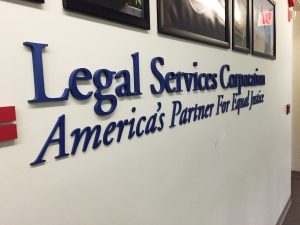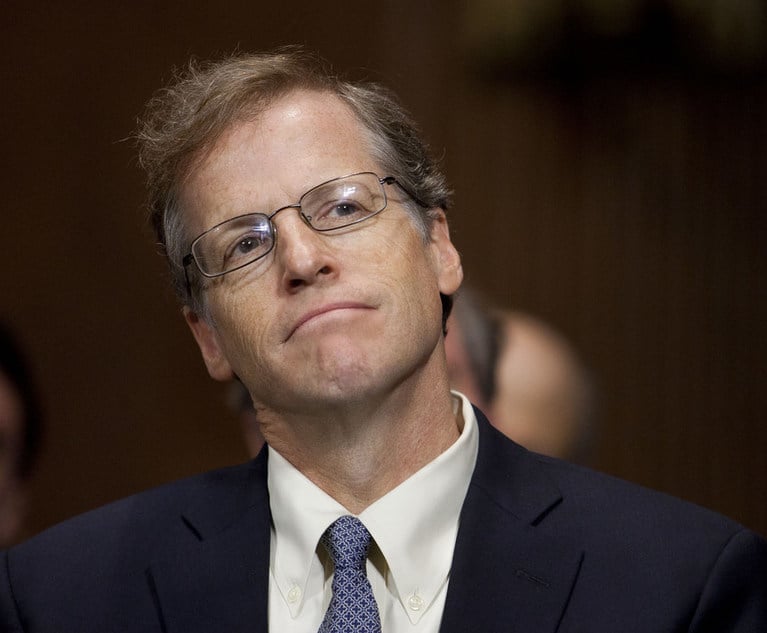Encouragement and Aspirations for the #LegalAidDefenders
Within the swirl of political activity of 2017 lay yet another attack on the Legal Services Corp., the federal agency that serves as the single largest funder of civil legal aid for low-income Americans.
March 02, 2018 at 03:31 PM
6 minute read

Within the swirl of political activity of 2017 lay yet another attack on the Legal Services Corp., the federal agency that serves as the single largest funder of civil legal aid for low-income Americans. President Donald Trump's budget called for elimination of funding for the LSC, which would have devastating effects on indigent clients who already face significant obstacles in obtaining equal access to justice.
While similar efforts to defund the LSC in the early 1980s and in the mid-1990s failed in the face of bipartisan support for LSC, the federal budget for fiscal year 2018 is still under debate, and the ultimate fate of LSC remains uncertain. Most recently, in October 2017, the Senate passed a House budget resolution which continues to call for the elimination of LSC. The corresponding report contains the following troubling language advocating for the elimination of the LSC:
“Eliminate the Legal Services Corporation. It is the duty of state and local governments to provide legal services to those individuals unable to provide it for themselves. Local jurisdictions are more aware of their citizens' needs and can provide more responsive service than the Federal Government. Critics have argued that despite restrictions already in place, the Legal Services Corporation too often focuses on social activist causes rather than advocating for those persons needing legal help the most.”
Needless to say, the realization of such recommendations would have devastating effect here in Connecticut, where our own legal aid organizations already struggle to meet an ever-increasing unmet need for indigent civil legal services. As summarized in the LSC's most recent budget request, there are currently 60.6 million Americans who are eligible for LSC-funded legal aid services nationwide. The LSC's 2017 funding levels, which have remained largely level for years, only allows grantees to meet a small percentage of that need, translating to an impressive, but still insufficient, 1.8 million people served.
The response of the bar in support of the LSC has been nothing short of inspiring, and we applaud these efforts wholeheartedly. The American Bar Association has coordinated a “Defend Legal Aid” campaign (www.defendlegalaid.org), and invited supporters to sign up as a “Legal Aid Defender,” which comes with a printable card and sheriff's badge reminiscent of something out of a classic Western film. Connecticut lawyers, through the Connecticut Bar Association and otherwise, have participated in these efforts publicly and enthusiastically. We commend these efforts, and encourage all of our readers to participate in the effort to preserve the LSC.
We trust and hope that the efforts of the Legal Aid Defenders will be successful. Those who have gone to the defense of the LSC have been unwavering and persistent. If those efforts are successful, and the LSC remains in place, we urge the Legal Aid Defenders not to ride off into the sunset, and to take up a few additional battles on behalf of the LSC.
First, the need to increase LSC funding remains ever urgent. As stated previously, the LSC has remained largely level-funded for decades. Efforts to increase funding even modestly, over the years and in the current budgetary wrangling, have met with little or no success, and there is some indication that even if the LSC remains in place, it will experience a funding cut. We would urge the Legal Aid Defender movement to continue to advocate for increased LSC funding. While such advice might seem quixotic in the current environment, ample evidence demonstrates that every dollar spent on civil legal services results in an exponential return of investment, both in terms of savings in other social safety net services, and also for the assisted household. A truly successful defense of the LSC would push for a meaningful investment in closing the “justice gap” that exists throughout this nation.
Second, many of the restrictions placed on lawyers working for the LSC should be lifted. LSC grantees are barred from bringing class-action lawsuits, certain types of actions against governmental agencies and officials, most activities involving welfare reform, and engaging in most lobbying activities, among other restrictions. While seemingly a political “third rail,” lifting the restrictions is a necessary step in ensuring that LSC grantees can meet their mandate of ensuring equal access to justice. Lifting those practice restrictions would allow legal services lawyers to realize efficiencies and to obtain broader relief for larger groups of clients through systemic advocacy, thereby doing “more with less” at a time when less, and maybe none, is a practical reality.
Moreover, these restrictions on a LSC-funded lawyer's right to practice are inconsistent with our professional code of ethics. Rule 5.4 of the Connecticut Rules of Professional Conduct bars lawyers from permitting a person who employs or pays a lawyer “to direct or regulate the lawyer's professional judgment in rendering such legal services.” Lawyers are similarly barred from entering into arrangements in which a nonlawyer “has the right to direct or control the professional judgment of a lawyer.” Rule 5.6 bars lawyers from participating in offering or making agreements containing certain restrictions on the right to practice. While perhaps not strictly violating these rules, the LSC restrictions are certainly inconsistent with an ethical code which emphasizes professional independence and disfavors restrictions on a lawyer's right to practice.
This is especially important because LSC-funded lawyers are often the only lawyers available to indigent clients. If the underlying motivation to these ethical rules is to preserve and protect access to justice and a client's choice of representation, then many of the LSC practice restrictions are ethically troubling. Lawyers for the poor should not be handicapped before undertaking representation of a client, and should be able to recommend, and pursue, every method of legal recourse available to their counterparts in the private bar.
We acknowledge that these two recommendations might seem aspirational, and even unrealistic, in the current political climate. At the same time, pursuit of equal access to justice is, in and of itself, an aspirational ideal, and resort to the status quo, leaving millions of Americans without equal access to justice, cannot be our final end.
This content has been archived. It is available through our partners, LexisNexis® and Bloomberg Law.
To view this content, please continue to their sites.
Not a Lexis Subscriber?
Subscribe Now
Not a Bloomberg Law Subscriber?
Subscribe Now
NOT FOR REPRINT
© 2025 ALM Global, LLC, All Rights Reserved. Request academic re-use from www.copyright.com. All other uses, submit a request to [email protected]. For more information visit Asset & Logo Licensing.
You Might Like
View All
35 Years After CT's Affordable Housing Act, Progress Remains a Struggle
4 minute read

Trending Stories
- 1Some Thoughts on What It Takes to Connect With Millennial Jurors
- 2Artificial Wisdom or Automated Folly? Practical Considerations for Arbitration Practitioners to Address the AI Conundrum
- 3The New Global M&A Kings All Have Something in Common
- 4Big Law Aims to Make DEI Less Divisive in Trump's Second Term
- 5Public Notices/Calendars
Who Got The Work
J. Brugh Lower of Gibbons has entered an appearance for industrial equipment supplier Devco Corporation in a pending trademark infringement lawsuit. The suit, accusing the defendant of selling knock-off Graco products, was filed Dec. 18 in New Jersey District Court by Rivkin Radler on behalf of Graco Inc. and Graco Minnesota. The case, assigned to U.S. District Judge Zahid N. Quraishi, is 3:24-cv-11294, Graco Inc. et al v. Devco Corporation.
Who Got The Work
Rebecca Maller-Stein and Kent A. Yalowitz of Arnold & Porter Kaye Scholer have entered their appearances for Hanaco Venture Capital and its executives, Lior Prosor and David Frankel, in a pending securities lawsuit. The action, filed on Dec. 24 in New York Southern District Court by Zell, Aron & Co. on behalf of Goldeneye Advisors, accuses the defendants of negligently and fraudulently managing the plaintiff's $1 million investment. The case, assigned to U.S. District Judge Vernon S. Broderick, is 1:24-cv-09918, Goldeneye Advisors, LLC v. Hanaco Venture Capital, Ltd. et al.
Who Got The Work
Attorneys from A&O Shearman has stepped in as defense counsel for Toronto-Dominion Bank and other defendants in a pending securities class action. The suit, filed Dec. 11 in New York Southern District Court by Bleichmar Fonti & Auld, accuses the defendants of concealing the bank's 'pervasive' deficiencies in regards to its compliance with the Bank Secrecy Act and the quality of its anti-money laundering controls. The case, assigned to U.S. District Judge Arun Subramanian, is 1:24-cv-09445, Gonzalez v. The Toronto-Dominion Bank et al.
Who Got The Work
Crown Castle International, a Pennsylvania company providing shared communications infrastructure, has turned to Luke D. Wolf of Gordon Rees Scully Mansukhani to fend off a pending breach-of-contract lawsuit. The court action, filed Nov. 25 in Michigan Eastern District Court by Hooper Hathaway PC on behalf of The Town Residences LLC, accuses Crown Castle of failing to transfer approximately $30,000 in utility payments from T-Mobile in breach of a roof-top lease and assignment agreement. The case, assigned to U.S. District Judge Susan K. Declercq, is 2:24-cv-13131, The Town Residences LLC v. T-Mobile US, Inc. et al.
Who Got The Work
Wilfred P. Coronato and Daniel M. Schwartz of McCarter & English have stepped in as defense counsel to Electrolux Home Products Inc. in a pending product liability lawsuit. The court action, filed Nov. 26 in New York Eastern District Court by Poulos Lopiccolo PC and Nagel Rice LLP on behalf of David Stern, alleges that the defendant's refrigerators’ drawers and shelving repeatedly break and fall apart within months after purchase. The case, assigned to U.S. District Judge Joan M. Azrack, is 2:24-cv-08204, Stern v. Electrolux Home Products, Inc.
Featured Firms
Law Offices of Gary Martin Hays & Associates, P.C.
(470) 294-1674
Law Offices of Mark E. Salomone
(857) 444-6468
Smith & Hassler
(713) 739-1250











